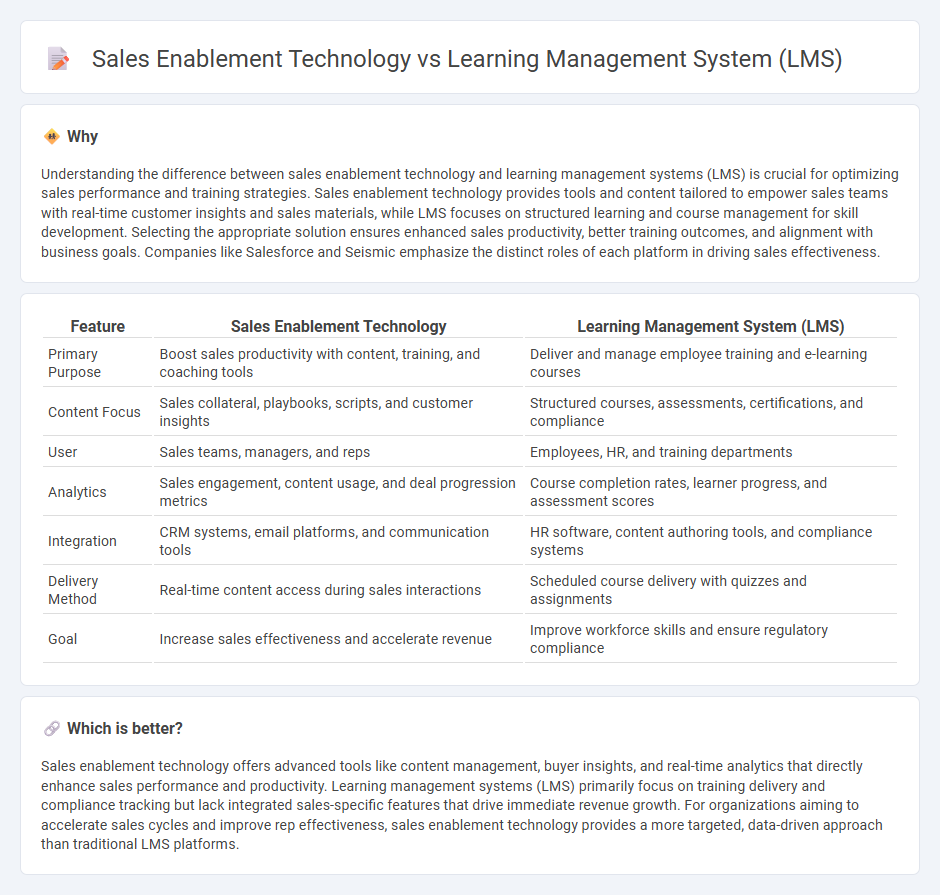
Sales enablement technology streamlines access to sales content, training, and analytics to boost seller productivity and improve customer engagement. Learning Management Systems (LMS) focus on delivering, tracking, and managing formal training programs across organizations, including onboarding and compliance courses. Explore the key differences between sales enablement tools and LMS platforms to optimize your sales team performance.
Why it is important
Understanding the difference between sales enablement technology and learning management systems (LMS) is crucial for optimizing sales performance and training strategies. Sales enablement technology provides tools and content tailored to empower sales teams with real-time customer insights and sales materials, while LMS focuses on structured learning and course management for skill development. Selecting the appropriate solution ensures enhanced sales productivity, better training outcomes, and alignment with business goals. Companies like Salesforce and Seismic emphasize the distinct roles of each platform in driving sales effectiveness.
Comparison Table
| Feature | Sales Enablement Technology | Learning Management System (LMS) |
|---|---|---|
| Primary Purpose | Boost sales productivity with content, training, and coaching tools | Deliver and manage employee training and e-learning courses |
| Content Focus | Sales collateral, playbooks, scripts, and customer insights | Structured courses, assessments, certifications, and compliance |
| User | Sales teams, managers, and reps | Employees, HR, and training departments |
| Analytics | Sales engagement, content usage, and deal progression metrics | Course completion rates, learner progress, and assessment scores |
| Integration | CRM systems, email platforms, and communication tools | HR software, content authoring tools, and compliance systems |
| Delivery Method | Real-time content access during sales interactions | Scheduled course delivery with quizzes and assignments |
| Goal | Increase sales effectiveness and accelerate revenue | Improve workforce skills and ensure regulatory compliance |
Which is better?
Sales enablement technology offers advanced tools like content management, buyer insights, and real-time analytics that directly enhance sales performance and productivity. Learning management systems (LMS) primarily focus on training delivery and compliance tracking but lack integrated sales-specific features that drive immediate revenue growth. For organizations aiming to accelerate sales cycles and improve rep effectiveness, sales enablement technology provides a more targeted, data-driven approach than traditional LMS platforms.
Connection
Sales enablement technology integrates with learning management systems (LMS) to streamline training and content delivery, ensuring sales teams access real-time resources and skill development materials. This connection enhances onboarding efficiency, knowledge retention, and performance tracking by embedding interactive modules and assessments directly into the sales workflow. Companies leveraging this integration report higher sales productivity and improved quota attainment due to continuous, contextual learning aligned with evolving buyer needs.
Key Terms
Training Content
Learning management systems (LMS) primarily centralize and deliver structured training content, including e-learning modules, quizzes, and certifications, designed to enhance employee skills and compliance. Sales enablement technology focuses on providing dynamic, role-specific content such as product information, sales scripts, and competitive insights to empower sales teams in real-time interactions. Explore the differences and benefits of both systems to optimize your training and sales strategy.
Sales Performance Analytics
Sales Performance Analytics in learning management systems (LMS) primarily track training completion rates and knowledge retention, while sales enablement technology provides deeper insights into sales behaviors, deal progress, and revenue impact. LMS platforms often offer basic analytics tied to course effectiveness, whereas sales enablement tools integrate CRM data to deliver actionable intelligence that drives sales strategy and performance improvement. Explore how combining LMS and sales enablement analytics can maximize your sales team's efficiency and revenue growth.
Sales Playbooks
Sales Playbooks within a Learning Management System (LMS) provide structured training modules, ensuring consistent onboarding and skill development for sales teams. Sales enablement technology, however, offers real-time, interactive playbooks designed to optimize sales activities and improve customer interactions on the go. Explore how integrating these tools can empower your sales force by visiting our detailed guide.
Source and External Links
Learning management system - Wikipedia - An LMS is software for administering, tracking, reporting, and delivering educational courses and training programs, widely used especially in higher education and remote learning, often featuring analytics and automated course recommendations.
What is a Learning Management System (LMS)? - TechTarget - LMS is web-based technology for planning, implementing, and assessing learning processes, allowing instructors to create content, monitor participation, and assess performance, used by schools, businesses, and governments.
What is an LMS (Learning Management System)? - Docebo - An LMS platform helps create, deliver, and manage educational or training programs efficiently, offering cost savings, tracking learner progress, reducing training time, and ensuring compliance in various sectors.
 dowidth.com
dowidth.com